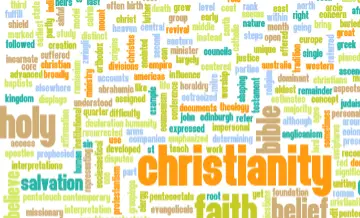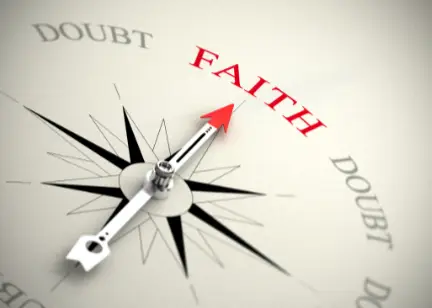Many believers have heard about sanctification as what follows after our Abba Father justifies us when we receive his Son as our Lord and Savior. But most need to think more about it or know exactly how to do it. But it is the heart of biblical counseling and what lit me up in seminary. This message is a launching pad for the sanctification process. The combination of relationship and sanctification might re-energize Christianity. Thank you, Holy Spirit.
Billy Graham’s wife of 54 years, Ruth, was asked what the secret to their long marriage was, and she answered, “a happy marriage is the union of two great forgivers.” More than any other subject in Scripture, the concept of sanctified marriage as our relationship with our Abba Father leads us to obey our Abba Father’s call to love and then forgive as an expression of love. As described in our previous message, we can now understand the obedient component of agape love.
In Matthew 22:36, toward the end of Jesus’ time on earth and after he silenced the Sadducees, a Pharisee challenges Jesus with, “Teacher, which is the great commandment in the law?” And Jesus answers, “Thou shalt love the Lord thy God with all thy heart, and with all thy soul, and with all thy mind.” And Jesus then immediately adds, “And the second is like it – “Agape your neighbor as yourself.” Remember that this is before Jesus has sealed the New Covenant with his blood.
Too many believers read this and think that just loving our Abba Father is what faith is all about. But that “neighbor guy?” I’m not so sure God; he is a little weird. I will love you, God, and that will be fine. You and me, God, Right? Loving your neighbor is not given much thought other than trying to be nice.
What Jesus said next changed the world forever. Matthew 22:40 NKJV, “All the Law and the Prophets hang on these two commandments.” He meant “ALL the word of God” hangs on those two commandments. That is how God spoke to his people in the Old Testament, through the law and the prophets.
What Jesus did in those three verses was take all of the “thou shall nots” of the Old Testament law and turn them completely around into just two universal commandments, love God and love all his children with all our heart. Those are dual “Greatest Commandments,” equal in importance!
The Old Testament commandments were “do nots” changed into “just LOVE” by the New Covenant with Jesus. Not loving is the only post-Jesus sin, which covers many behaviors. What our Abba Father wants in his relationship with us is that when we look toward others, all his children, we see them only through the eyes of the love of Jesus. Nothing but unconditional love, and when we center our heart on that concept as our approach to life, we start to feel the full blessings of our Abba Father, and we cannot help ourselves in wanting to please him (glorify) with our life.
We must look at one more Scripture to end this part of the message because Jesus went on to set the bar much higher than his Old Testament “love thy neighbor as yourself” response to a Pharisee looking for a reason to arrest Jesus. Too many people do not love themselves enough to let that remain the standard in the New Covenant of Jesus. If we do not love ourselves, our neighbor is out of luck! That is not our Abba Father’s plan.
In John 15:9-11, Jesus says, “Even as the Father hath loved me, I also have loved you: abide ye in my love. If ye keep my commandments, ye shall abide in my love; even as I have kept my Father’s commandments, and abide in his love. These things have I spoken unto you, that my joy may be in you, and that your joy may be made full.” We are not talking about a superficial, when we feel like it, love. We are talking about striving to exhibit the most powerful love there is, our Abba Father’s love! With that love, our joy is full! ELB makes that very difficult to achieve. (Hopefully your awareness of “abide” helps power the above verse.)
However, knowing what our Abba Father wants and doing it are two very different things. To fly with the eagles, we need to add forgiveness to our life, which is the essential tool in the Scripture other than the Holy Spirit himself.
Mathew 6:12 (from the “our Father” prayer) says, “forgive us our debts as we forgive our debtors.” If we want our Abba Father to forgive us, show him our love by getting ourselves into the forgiveness business right now! 1 John 1:9, “If we confess our sins, he is faithful and righteous to forgive us our sins, and to cleanse us from all unrighteousness.”
We have to understand the difference between our Abba Father “forgiving” us and us forgiving others. He does not forgive us the same as us forgiving others. Our Abba Father washes sin out of us and purifies us to be in his presence. If only we could do that with our neighbors.
Jesus in us and us in him is the pathway for forgiveness, similar to polaroid sunglasses that block the glare but let the pure image through. This thought comes from my need to reconcile our continuous sinning in this life and our Abba Father still seeing us. Jesus endured unthinkable torture and death on the cross to wash away our sins (forgive us) and create a path back to our relationship with our Abba Father, as he created in paradise for eternity. We need to pray on that sacrifice and make the effort to forgive others our sacrifice.
Importance
The importance of forgiveness to Jesus is unmeasurable. Matthew 6:14-15, “For if ye forgive men their trespasses, your heavenly Father will also forgive you. But if ye forgive not men their trespasses, neither will your Father forgive your trespasses.” There is, however, a problem with our forgiveness of others in that no one knows what it means for people to forgive each other.
Usually, it means just burying the feelings of being hurt. But if we look at why our Abba Father forgives us, it is to allow us to have a relationship with him. But to do that, the impediment has to be removed. With Our Abba Father, the impediment is sin, but with us and others, the impediment is pride, anger, and hurt.
Forgiveness starts with finding our agape for the person that hurt us! Our Abba Father’s forgiveness is driven by agape because our Abba Father IS agape. And that is the key to understanding our forgiveness as well. What is so great about a heart full of agape is that we now have a tool of forgiveness everyone can understand and execute.
It is essential to understand that forgiveness is a two-part process, forgive and then drain the tension, be it hurt, anger, or both. Love is the Light, and un-forgiveness is the darkness. Darkness is not the opposite of light; it is the absence of light and cannot stop the light from shining. The “draining process” starts with conversations with our Abba Father, asking for his help which is one of the best ways to feel his presence in us and strengthen our relationship with him.
Also, understand that Jesus took our sins onto him, but we also must want to participate with him afterward. Our Abba Father does not command us to reunite with our neighbor but to forgive and release our anger from dragging us down, i.e., doing agape. Likewise, the party that hurt us might not get to where we are in the forgiving process.
I see many people in jail and prison who have had their lives wrecked by a parent or relative; that abuse works well for illustration. When we have severe hurt, take the time to go to our Abba Father and tell him that we want to forgive the person who hurt us and find our agape love for them.
Then ask him to help us, which will trigger the Holy Spirit to move in and help us find our agape. That changes our lives and brings us closer to our Abba Father in a manner we can feel. Take the time to let the forgiveness work, find your love, and relax; the Light of agape will drive out the darkness of the hurt.
Our Stop Switch
The second part of this message is to change our life by building a “stop switch” inside our hearts that triggers the instant we start to feel the tension built in response to ANY human stimulus. Especially understand that impatience and jealousy are human responses (and New Testament sins) that forgiveness will cure; forgiveness is not just about hurt and anger. Being annoyed in the slow line at the grocery store, traffic, politics, work, you name it. ALL people-induced tensions are relieved by simply forgiving the people involved.
We do not even need to know who the people are. Forgiveness is the “universal solvent” and a life changer. The instant we start to feel tension, hit the stop switch, and declare forgiveness. Then tell our Abba Father and thank him for loving us so much that he wants us to be so free in spirit and joy. Thank you, Jesus!
Now, go back to what we said about love and connect it to forgiveness. We are now on our way to a changed and blessed life. When we see the slow line at the store, see it with love, not impatience. When we can do that, we have arrived where our Abba Father and us want to be with each other.
The third part of this message is when we are the offender and hurt others. There is a broad spectrum of believers, from those who are usually very nice people to those who are not and offend freely without remorse. ELB drives those on the latter end (self-centered ego), which demonstrates why focusing on our Groom/bride relationship with our Abba Father is so important. That relationship draws our life into a context with the universal love of all others, as our Abba Father commands.
I repeat 1 Corinthians 13:4-7 so that we can read it in the context of how we treat all others, not just the people we say “I love you” to. “Love suffereth long, and is kind; love envieth not; love vaunteth not itself, is not puffed up, doth not behave itself unseemly, seeketh not its own, is not provoked, taketh not account of evil; rejoiceth not in unrighteousness, but rejoiceth with the truth; beareth all things, believeth all things, hopeth all things, endureth all things.”
Hopefully, that passage resonated with who our Abba Father meant us to be in our relationship with all his children. That is an essential part of our sanctification process. We must strive to avoid offending and hurting others, agape love and get out of ELB by raising this life to our Abba Father.
It is also essential to understand that offending and hurting others is a sin. Proverbs 10:12, “Hatred stirreth up strifes; But love covereth all transgressions.” That is where my concept of forgiveness, meaning finding our love, comes from. Please pray on that.
When we have offended or hurt others, we have sinned because it is not love. Scripture addresses anger by name, so it is tempting only to count holding anger as a sin. But gossip, broken promises, rudeness, selfishness, annoyance, etc., are all post-Jesus sins. It is not apparent that believers understand this and confess all of it.
That is critical because it increases self-awareness in our lifelong sanctification process. So now is the time to decide, do we glorify our Abba Father in the sanctification process or succumb to ELB and hold on to our ungodly behaviors?
Fixing Damage
The next move is fixing the damage we cause. Step one is going to our Abba Father for his forgiveness, assured by sincere confession. Believers are pretty good about confessing the big things but pay little attention to the small things we may do without much notice or apparent damage. That is what the sanctification process is about, the little things. Being in a relationship with our Abba Father reminds us of its goals. From this point on, the commandment to love others guides our path. If we offend or hurt someone, our answer to them is to learn to show them our love.
But remember, love is our tool to achieve an outcome, not just a broadcast. Our Abba Father defines the desired outcome in Matthew 5:23-24, “If therefore thou art offering thy gift at the altar, and there rememberest that thy brother hath aught against thee, leave there thy gift before the altar, and go thy way, first be reconciled to thy brother, and then come and offer thy gift.”
“Make peace” is our Abba Father’s general interactional command. The Hebrew and Greek concordances for “peace” list completeness, soundness, welfare, safety, health, prosperity, quiet, tranquility, contentment, and friendship. I like the phrase, “happiness comes from happenings, but peace and joy come from our Abba Father.” love is our tool, and peace is our interpersonal goal with all our Abba Father’s children. Peace also reinforces the obedience and doing context of agape love as opposed to the emotional love that dominates ELB.
Scripture guides us further in making peace. Romans 14:19, “So then let us follow after things which make for peace, and things whereby we may edify one another.” 1 Thessalonians 5:11 NKJV, “Therefore encourage one another and build one another up, just as you are doing.” Romans 12:18 NKJV, “If possible, so far as it depends on you, live peaceably with all.” Psalm 34:14 NKJV, “Turn from evil and do good; seek peace and pursue it.” Hebrews 12:14 NKJV, “Make every effort to live in peace with everyone and to be holy; without holiness no one will see the Lord.” Please pray on the peace goal and its role in our sanctification.
Forgiving Ourselves
The next part of this message is about “forgiving ourselves.” Forgiving ourselves when we have wronged is commonly used in ELB, not Scripture. ELB offers it as the solution to feeling guilty, a common struggle in biblical counseling. Proverbs 14:9 NKJV, “Fools make fun of guilt, but the godly acknowledge it and seek reconciliation.” In Scripture, guilt is a judgment (we did wrong), not a feeling. Nowhere are “guilty feelings” given any life in Scripture.
Feeling guilty is a product of psychology and the enemy, which is why we see it in biblical counseling. Our Abba Father sacrificed his Son to wash us clean. Every time we sin and confess, we are washed clean because our Abba Father wants us to live in peace and joy with him.
The enemy says that is not true; we need to feel bad, which leads to doubting our Abba Father, the enemy’s goal with his lie. The ultimate in ELB is to tell our Abba Father his Word is not good enough. That cannot glorify our Abba Father.
Our Abba Father tells us what to do, exude agape love and make peace as part of our continuing sanctification. If we do this, we meet our Abba Father’s expectations. Anything else is disobedience.
Sanctification must be the driving force for self-improvement in every aspect of our lives, not psychology and feelings. If we strive to sanctify ourselves and glorify our Abba Father, he will care for the rest. We are now ready to learn how to start conversing with our Abba Father with new confidence.



